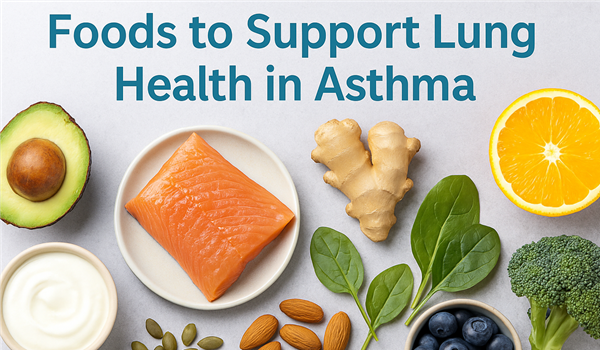Asthma diet lung health nutrition

Patient Information Leaflet: Foods to Support Lung Health in Asthma
Kensington Medical Centre – Belfast
⸻
Asthma and Diet
While food can’t cure asthma, eating a healthy, balanced diet may help reduce inflammation in the airways, support your immune system, and improve overall lung function. Certain foods may ease asthma symptoms, while others can trigger them in some people.
⸻
How Food May Help
• Reduce inflammation in the lungs
• Support your immune system
• Maintain a healthy weight, which can ease asthma symptoms
• Avoid nutrient deficiencies that might affect breathing
⸻
Helpful Foods for People with Asthma
1. Fruits and Vegetables
Rich in antioxidants (like vitamins C and E) that may protect the lungs.
Examples: oranges, berries, tomatoes, carrots, spinach, broccoli
2. Omega-3 Fatty Acids
May help reduce airway inflammation.
Examples: oily fish (salmon, mackerel, sardines), flaxseeds, walnuts, chia seeds
3. Vitamin D Sources
Low vitamin D levels may worsen asthma symptoms.
Examples: eggs, oily fish, fortified dairy or plant-based milks, fortified cereals
4. Magnesium-Rich Foods
Magnesium may help with breathing and relaxing muscles.
Examples: leafy greens, nuts (almonds, cashews), seeds, beans, wholegrains
5. Water
Staying hydrated helps keep your airways moist and easier to clear.
⸻
Foods to Watch or Limit
Some people with asthma may find certain foods trigger their symptoms. If this applies to you, discuss it with your doctor or dietitian.
Potential triggers include:
• Sulfites – found in wine, dried fruits, and some processed foods
• Food additives – like artificial colourings and preservatives
• Salicylates – naturally found in some fruits and spices (rarely a problem)
• Allergens – like dairy, eggs, nuts, or wheat (only if you have a food allergy)
Tip: Keep a food and symptom diary if you suspect any foods worsen your asthma.
⸻
Healthy Eating Tips
• Aim for 5 portions of fruit and veg each day
• Include oily fish 1–2 times a week
• Choose wholegrains over white bread, rice, and pasta
• Drink water throughout the day
• Maintain a healthy weight – being overweight can make asthma harder to manage
• Avoid processed and sugary foods where possible
⸻
When to See a Doctor
Speak to your GP if:
• Your asthma symptoms are getting worse
• You notice certain foods trigger wheezing, coughing, or shortness of breath
• You’re unsure if supplements or dietary changes are right for you
• You need help creating a balanced meal plan
Your GP or asthma nurse can help you manage symptoms and may refer you to a dietitian if needed.
⸻
For more information, visit www.nhs.uk/conditions/asthma
This leaflet is for general information only. Please speak to your healthcare provider for advice specific to you.
Medical Disclaimer
The dietary advice and information provided in this leaflet are for general guidance and educational purposes only. They are not intended to replace personalised advice, diagnosis, or treatment from a qualified healthcare professional.
If you have a medical condition, are taking medication, are pregnant or breastfeeding, or have specific dietary needs or food allergies, you should consult your GP, dietitian, or another healthcare provider before making significant changes to your diet.
Following general dietary recommendations without proper medical supervision may not be suitable for everyone and could result in unintended health effects. Always seek individualised medical advice for your personal health circumstances.
Page created: 01 June 2025